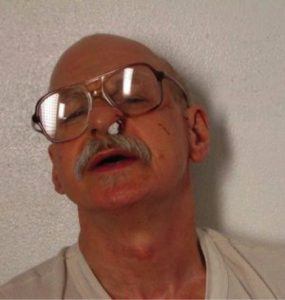Arkansas’ 5th execution in 2017 still on schedule for Nov. 9
by November 3, 2017 4:03 pm 565 views

Gov. Asa Hutchinson said Friday (Nov. 3) that the planned execution of Arkansas death row inmate Jack Greene is on schedule for next week, despite concerns the prisoner is mentally ill. Also possible is an eleventh-hour state Supreme Court ruling that could reverse state law that hides details of the state’s lethal injection protocol.
Speaking to State Capitol reporters via a Skype conference call on Friday, Hutchinson said Greene’s execution on Thursday (Nov. 9) is moving forward after a thorough review of the death-row inmate’s case, noting that standard mental competency set by the U.S. Supreme Court has been met.
“I have reviewed all documents, transcripts, and comments from interested mental health professionals as well as the video of the clemency hearing before the Parole Board, which included Jack Greene’s testimony,” Hutchinson told reporters. “In that testimony, Jack Greene acknowledged that he understands he is being executed for the murder of Sidney Burnett and discusses why he made the decision to kill Mr. Burnett.”
Hutchinson added: “Numerous courts have reviewed the case and I am satisfied that the Supreme Court’s standards have been met and that he is competent to be executed. As normal, I will continue to review any additional relevant facts as Nov. 9 approaches.”
On Oct. 5, the Arkansas Parole board voted to deny clemency for Greene. A week earlier, Gov. Hutchinson scheduled Greene’s death by lethal injection after Arkansas Attorney General Leslie Rutledge requested an execution date be set for the longtime death-row inmate convicted of capital murder on Oct. 15, 1993. On the same day, Hutchinson granted clemency to former death row inmate Jason McGehee after the Parole Board earlier recommended that his death sentence be changed from death to life in prison with parole.
HEAD ‘SURGICALLY REMOVED’
Greene’s attorneys continue to ask Hutchinson and the courts for mercy, saying his clemency petition contains information about his horrific childhood of extreme poverty and sexual abuse, as well as a family history of mental illness and suicides.

“Mr. Greene is a severely mentally ill man—exactly the kind of person our laws prohibit from execution,” said Scott Braden, a federal defender who represents Greene. “The U.S. Supreme Court has been clear that capitally-sentenced prisoners must rationally understand the meaning of their punishment. Decency requires that, at the very least, Arkansas must hold a hearing, with a neutral decision-maker, to examine Mr. Greene’s competency to be executed before any execution can lawfully take place.”
On Friday, lawyers representing Greene said their client wants his head surgically removed after his execution.
“Mr. Greene’s will, as dictated to one of his attorneys, describes how he would like his head “surgically removed from [his] body” so his brain can be examined by a doctor he saw on television. Mr. Greene believes his brain will show the extent of the (imagined) injuries that his severe mental illness causes him to believe the prison has inflicted on him during his confinement,” noted the statement.
CLEMENCY UNLIKELY
Hutchinson would not rule out reconsidering of Greene’s clemency request if additional information was revealed, but said there is nothing yet that convinces him otherwise.
“I’ve seen nothing that causes me concern from proceeding forward at this point, obviously we will continue to receive any information to evaluate that, but at this point the execution is still on schedule and will remain on schedule.”
Hutchinson added that gubernatorial precedent keeps clemency available until the prisoner enters the death chamber and is lethally injected.
“You never foreclose any action in the future, but I also want to indicate I see nothing in the files or information brought to me that would change my view that the penalty of the jury should be carried out …,” Hutchinson reiterated.
Greene was convicted for the 1991 murder of 69-year old Sidney Burnett, a preacher living in Knoxville in Johnson County. According to court reports and media accounts, Greene tortured, stabbed and shot Burnett for helping his ex-girlfriend who was trying to escape from Greene’s abuse. Before killing Burnett, Greene had traveled the week before to North Carolina and shot and killed his brother, Tommy Greene.
Greene’s case has received little of the national attention centered on the Arkansas Department of Correction’s Cummins Unit in April after Hutchinson had proposed to execute eight inmates, a move without precedent in U.S. legal history.
Ledell Lee was the first inmate to be executed on April 20, the state’s first visit to the death chamber in more than a decade. Marcel Williams and Jack Jones were executed April 24, marking the first time since 2000 a state executed two inmates in one day. Kenneth B. Williams became the fourth Arkansas death-row inmate to die by lethal injection at the hands of the state in the period of seven days on April 27.
McGehee, Don Davis, Bruce Ward and Stacey Johnson all had their executions postponed due to stays or injunctions filed by different courts.
EXECUTION DRUG SECRECY
In a related matter, the state Supreme Court on Thursday ruled that ADC officials must provide Little Rock attorney Steven Shults with the pharmaceutical package inserts and labels for its supply of midazolam, one of the drugs in the state’s execution protocol.
A month ago, the state high court halted a ruling by Pulaski County Circuit Court Judge Mackie Pierce that the legislature could not shield information about the drugs used to carry out executions.
In early August, ADC spokesman Solomon Graves said correction officials had acquired a new supply of midazolam, the controversial sedative that is part of the state’s three-drug execution protocol. Vecuronium bromide, a muscle relaxer that causes paralysis, is the second drug used in ADC’s execution protocol, while potassium chloride stops the heart and causes death.
Although the high court’s ruling won’t delay Greene’s execution, Hutchinson said the intent behind the Arkansas Legislature’s 2013 rewrite of the state law shielding the identities of execution drug suppliers was to protect the source of the three drugs.
“That has been the standard that we adopted that the Supreme Court affirmed earlier in the year, now they’ve indicated the exemption for manufacturers is not as clear as it should be,” Hutchinson said. “We will have to look and see whether it demands a legislative fix down the road, but in the meantime, we will work with the Attorney General as it goes back to the lower court to determine what needs to be redacted and comply with the Supreme Court ruling.”
